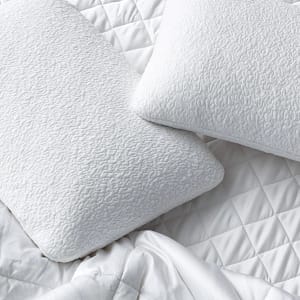Allergic rhinitis affects about 20-30% of adults in the U.S. It’s even more prevalent among children. This condition is caused by sensitivity to allergens like dust mites, pet dander, pollen, and mold.
Allergic rhinitis can severely affect your sleep and overall quality of life. That’s why it is crucial to know about the common allergens so that you can get rid of them.
Let’s take a closer look at the most common allergens that disrupt sleep.
Most Common Allergens That Affect Sleep
Dust Mites
To manage dust mite allergies, replace or cover furniture and accessories that trap dust, including both feather and synthetic pillows. Regularly wash your bedding in hot water and use sealable covers for pillows and mattresses.
Heavy curtains, carpets, and stuffed animals can also harbor dust mites and should be cleaned or replaced with more sterile options like laminate flooring or blinds.
Pollen
Pollen allergies, known as hay fever, are triggered by trees, grasses, or weeds like ragweed. These allergies are often seasonal, with symptoms worsening in spring, late summer, and early fall based on the specific plant’s pollen.
Hay fever tends to act up more during warm, dry weather. On high pollen count days, especially in the morning, it’s good to stay indoors. You can check the local pollen count through various sources like online, TV, or radio.
To minimize indoor pollen, keep doors and windows closed, change clothes after being outside, dry clothes indoors, and take a shower before bedtime, as pollen mainly comes from outside. These steps can help reduce exposure and enhance sleep quality during high pollen periods.
Mold
Allergies to mold spores often fluctuate depending on the seasons, since mold thrives in cold and damp conditions. To prevent mold, reducing humidity in your home is the key.
A well-ventilated bathroom after showering helps hinder mold growth. If lacking proper ventilation, wiping down wet surfaces and fully extending the shower curtain for drying can slow mold growth. Using a dehumidifier or increasing the heat might also assist in controlling mold.
Immediate cleaning of mold is crucial in keeping allergies in check. Check for mold around various places like taps, sinks, shower curtains, refrigerator trays, dish racks, carpets, stuffed animals, and books. Also, ensure clothing and towels are thoroughly dried to prevent musty odors associated with mold.
Pet Dander
A common year-round allergy is caused by pet dander, the skin, and saliva particles from household pets. Sharing a bed with pets can worsen nighttime allergy symptoms, so giving your furry friend their own comfy bed could help.
Direct contact tends to trigger strong reactions, so try to avoid letting pets lick your face, touching your eyes after petting them, and always wash your hands after handling pets.
Pet allergies are year-round, but during pollen season, pets might bring in additional outdoor allergens. Giving pets regular baths using non-allergenic shampoo can help reduce indoor allergen levels.
Different pets vary in their allergen production. Some find relief with hairless cats or hypoallergenic dogs, but even these breeds might shed allergens. As reactions vary, it’s wise to test exposure before adopting a new pet to understand your response.
Cockroaches
Proteins in cockroaches, as per the Asthma and Allergy Foundation of America (AAFA), can trigger hay fever-like symptoms in certain individuals. These proteins are found in the cockroach’s body, saliva, and waste, and they can continue to cause allergies even after the cockroach has died.
To prevent these pests, it’s crucial to maintain strict hygiene. Regularly clean your home, ventilate damp areas, secure garbage cans, and food sources, and avoid leaving food or dirty dishes lying around. This helps keep cockroaches out of your home.
Household Products and Cigarette Smoke
Exposure to cigarette smoke and certain household products, like strongly scented cleaning products, has been associated with rhinitis symptoms according to a study in PLOS ONE. However, the mechanism might not involve allergic sensitization, unlike the allergens mentioned earlier.
Some Products to Keep the Allergies Away
To reduce exposure to these triggers, consider using unscented soaps and cleaning products. Additionally, ask smokers to smoke outside or near a window to minimize their exposure to cigarette smoke, helping to alleviate rhinitis symptoms.
If you live in a humid environment, use the Cozy Earth mattress pad to keep the allergies away. Made with premium 100% Viscose from bamboo, this cooling mattress pad is temperature regulating, perfect for hot sleepers or humid climates.
Another great product to try is the Temptune Mattress Pad. It is a soft, cushy, silent layer of temp-regulating goodness. This mattress pad cools and heats each sleeper as necessary.
Are you facing any of the allergies mentioned above? Join Wonderwise and chat for free on our WhatsApp to get more tips on how to control your allergic reactions and rid your environment of allergens. Click this URL to connect with us on WhatsApp.
